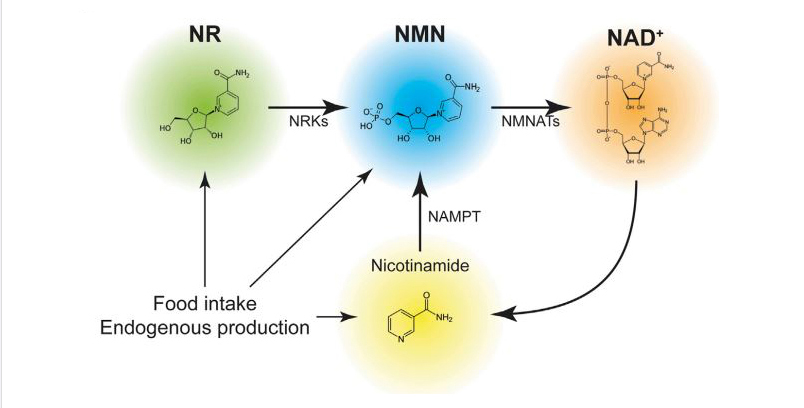Nicotinamide riboside (NR) is a form of vitamin B3 that has gained significant attention in recent years due to its potential health benefits, particularly its role in cellular metabolism and energy production. Comprehensive studies of nicotinamide riboside have focused on several key areas:
NAD+ Boosting: NR is a precursor to nicotinamide adenine dinucleotide (NAD+), a coenzyme critical for various cellular processes, including energy production, DNA repair, and gene regulation. Research has shown that NR supplementation can increase NAD+ levels in cells and tissues, which may have therapeutic implications for age-related diseases and metabolic conditions.
Mitochondrial Function: NR has been studied for its potential to enhance mitochondrial function. Mitochondria are the cellular organelles responsible for producing energy (ATP). Some research suggests that NR supplementation can improve mitochondrial efficiency and overall cellular energy production.

Anti-Aging Effects: Nicotinamide riboside has garnered attention for its potential anti-aging properties. Some studies in animals have suggested that NR supplementation can improve lifespan, metabolic health, and cognitive function. Human trials are ongoing to investigate these effects further.
Metabolic Health: NR has been explored for its potential in managing metabolic conditions like obesity, type 2 diabetes, and metabolic syndrome. It may help improve insulin sensitivity and support healthy metabolic function, although more research is needed in humans.
Neurological Health: NR’s role in boosting NAD+ levels has led to investigations into its potential for neuroprotection. Some studies have examined its effects on neurodegenerative diseases like Alzheimer’s and Parkinson’s, as well as cognitive decline associated with aging.
Exercise Performance: Nicotinamide riboside has been investigated for its potential to enhance exercise performance and endurance. Some studies suggest that NR supplementation may improve mitochondrial function and muscle performance, but results are mixed.
Safety and Tolerance: Comprehensive studies have also evaluated the safety and tolerance of NR supplementation. Generally, NR is considered safe when used at recommended doses, with minimal side effects reported. However, long-term safety data are still limited.
It’s important to note that while there is promising research on nicotinamide riboside, much of it is still in the early stages, and more extensive human trials are needed to fully understand its potential benefits and long-term effects. Additionally, the appropriate dosage and duration of NR supplementation for specific health conditions are areas of ongoing investigation.
Applications of Nicotinamide Riboside
Nicotinamide riboside (NR) is a form of vitamin B3 that has gained attention for its potential health benefits, particularly in the field of aging and age-related diseases. NR is a precursor to nicotinamide adenine dinucleotide (NAD+), a coenzyme that plays a crucial role in various cellular processes, including energy metabolism, DNA repair, and gene expression. Here are some clinical applications of nicotinamide riboside:
Aging and Age-Related Diseases: NR has been studied for its potential role in mitigating some aspects of aging and age-related diseases. NAD+ levels decline with age, and this decline is associated with a range of age-related health issues. NR supplementation aims to boost NAD+ levels, potentially improving cellular function and delaying the aging process. Clinical trials are ongoing to investigate NR’s effects on age-related conditions like cognitive decline, cardiovascular disease, and frailty.

Metabolic Health: NR may have a positive impact on metabolic health. Some studies suggest that NR supplementation can improve insulin sensitivity and reduce markers of metabolic syndrome, which includes conditions like obesity, high blood pressure, and elevated blood sugar levels. This has implications for managing type 2 diabetes and obesity.
Neurodegenerative Diseases: There is ongoing research into the potential benefits of NR in neurodegenerative diseases like Alzheimer’s and Parkinson’s disease. Boosting NAD+ levels may enhance mitochondrial function and improve cellular resilience, potentially slowing the progression of these conditions.
Muscle Function and Exercise Performance: Nicotinamide riboside supplementation has been explored for its potential to enhance muscle function and exercise performance. By supporting mitochondrial function, NR may improve energy production and reduce fatigue during physical activity.
Cardiovascular Health: Some studies have suggested that NR could have a positive impact on cardiovascular health. It may help reduce inflammation and improve vascular function, potentially reducing the risk of cardiovascular diseases like atherosclerosis.
Cancer Treatment: While research is still in its early stages, some studies have explored the potential of NR in combination with other therapies for cancer treatment. NAD+ is involved in DNA repair processes, and altering NAD+ levels may impact cancer cell survival and sensitivity to treatments.
It’s important to note that while these potential applications of NR are promising, much of the research is still in its early stages, and more clinical trials are needed to establish the safety and efficacy of NR supplementation for various health conditions. Additionally, individual responses to NR may vary, and more research is needed to determine optimal dosages and long-term effects.
Before considering NR supplementation for any specific health concern, it is advisable to consult with a healthcare professional who can provide guidance based on your individual health status and needs.
